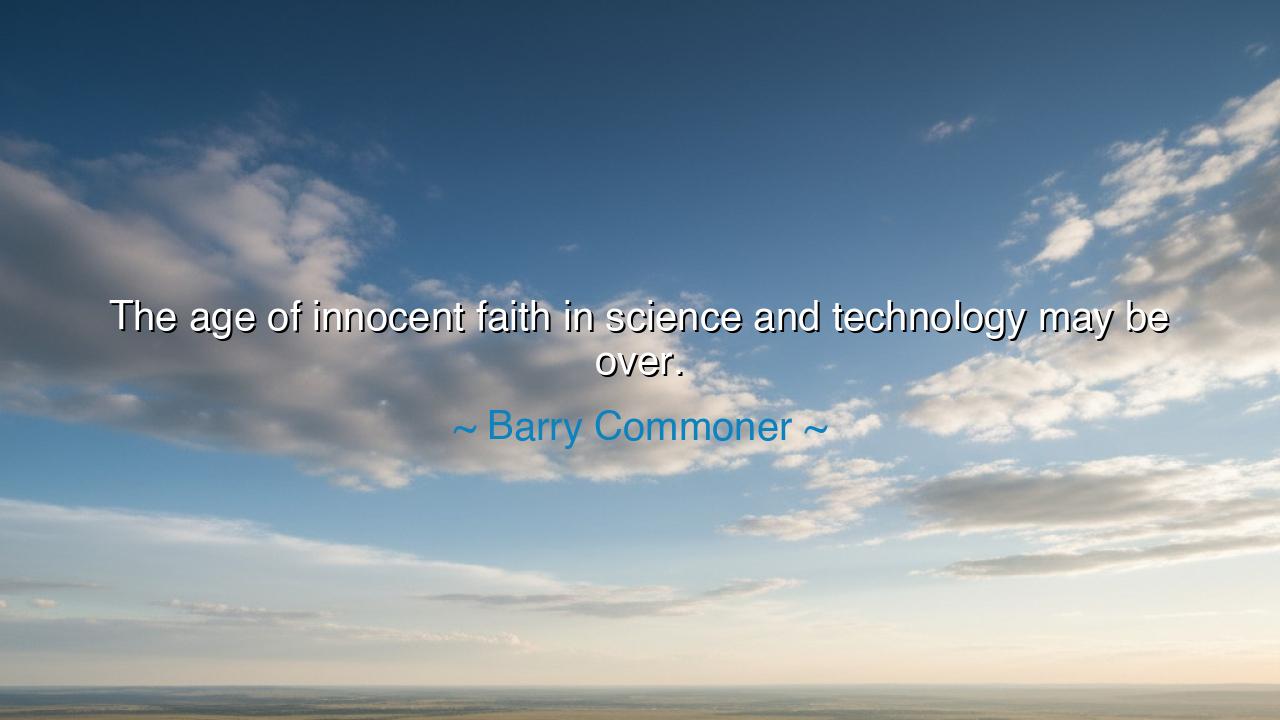
The age of innocent faith in science and technology may be over.






“The age of innocent faith in science and technology may be over.”
Thus spoke Barry Commoner, the scientist and prophet of ecology, whose words carried both the sorrow of disillusionment and the flame of awakening. His voice rose in the twentieth century, an era drunk with progress—when men split the atom, soared beyond the clouds, and declared that knowledge alone would save them. But in the triumph of invention, they failed to see the shadow cast by their own brilliance. Commoner’s warning is not against science itself, but against the blind worship of it—the belief that discovery alone guarantees wisdom, that progress without conscience leads anywhere but ruin.
For ages, humankind revered the scientist as once it did the priest, believing that truth could be found in the laboratory as it once was sought in the temple. The innocent faith that Commoner laments was the faith that science, untainted by greed or folly, would lift humanity into paradise. But as the decades unfolded, that innocence withered. The mushroom cloud over Hiroshima, the choking smoke of industry, the poisoned rivers and thinning air—all became reminders that human genius, unguided by ethics, can become its own destroyer. The tools that promised abundance now threaten to unmake the world that bore them.
Barry Commoner, born in the early 1900s, was among the first to see the fracture between knowledge and wisdom. As an ecologist, he studied not merely machines, but the living web they disrupted. In the mid-century, when progress was measured in speed and steel, he dared to speak of balance, of restraint, of the sacred duty owed to the Earth. His warning came as humanity stood on the threshold of a new age—the atomic, the digital, the synthetic—and yet, he foresaw that without humility, this age would not be our liberation, but our undoing.
History proves his insight true. Consider the story of Rachel Carson, whose book Silent Spring in 1962 revealed how pesticides—hailed as miracles of modern chemistry—were poisoning the soil, the water, and the creatures that sang in the morning. She was mocked at first, dismissed as sentimental, as anti-science. Yet time proved her right. Science without reverence had unleashed death where it promised life. Carson and Commoner stood as twin voices of warning: that knowledge must be wed to responsibility, and power must bow before nature’s law.
And so we see the meaning of Commoner’s lament: that innocence—the unthinking belief in science as a savior—must give way to maturity, the sober recognition that every discovery bears a cost. It is not science that is the danger, but the heart of man who wields it. The same fire that warms the hearth can burn the forest; the same medicine that heals can destroy when misused. To believe that technology alone will redeem us is to forget that it is merely the reflection of its maker’s soul. When that soul is restless, proud, or blind, its creations mirror its chaos.
Yet there is hope within this warning. For when innocence ends, wisdom can begin. The age of naive faith must give rise to an age of conscious stewardship. Science must become not a god, but a servant—an instrument guided by ethics, compassion, and foresight. The future depends not on how much we can build, but on how deeply we can understand the harmony of what already exists. Let the engineers and inventors of tomorrow remember that the Earth is not theirs to conquer, but to care for.
So, children of progress, take heed: knowledge is a flame, and you are its keepers. Use it not to dazzle, but to enlighten. Ask not only, “Can we do this?” but also, “Should we?” Let your faith in science be tempered by wisdom, as fire is contained within the lamp that it may give light and not destruction. As Barry Commoner taught, the time of innocence has passed; now must come the time of responsibility, where humanity wields its power with reverence for the fragile world that sustains it.
Practical teaching: Reclaim the bond between mind and heart. Study deeply, create boldly, but question relentlessly. Let every invention serve life, not pride. Support those who seek sustainability over profit, and cherish simplicity where complexity tempts you. For only when science is joined with conscience, and progress with humility, will the human story continue—not as a tragedy of brilliance, but as a hymn of wisdom fulfilled.






AAdministratorAdministrator
Welcome, honored guests. Please leave a comment, we will respond soon